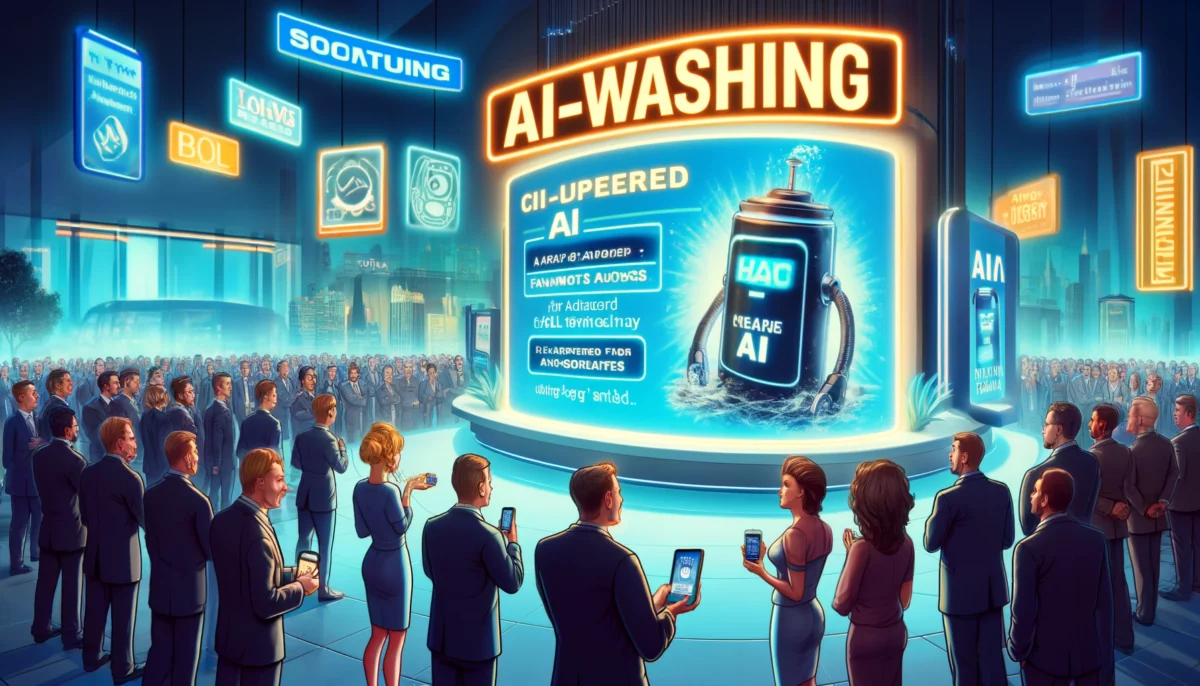The term “AI washing” (also known as “AI washing”) refers to a practice whereby companies and organizations describe or market their products, services or projects as artificial intelligence (AI), even though this description is either misleading or greatly exaggerated. This shows that exaggerated advertising of AI products in the course of AI washing can result in tangible criminal liability.
AI washing?
AI-washing is gaining in importance as AI becomes more and more present in everyday life and in public perception. Historically, AI has undergone many developments, but it was only with modern applications such as ChatGPT and Bard that its potential became tangible for the general public. However, this spread has also led to opportunities for misuse that are comparable to greenwashing.
It is likely to be a form of greenwashing, where marketing strategies are used to create the impression that something is more environmentally friendly than it actually is – only here the hype around AI is used to increase the perceived value or innovation of a product or service.
Reasons for AI washing
- Market perception and competitive pressure: As AI is seen as innovative and forward-looking, many companies want to convey this impression in order to stand out from the competition.
- Attracting investors: Start-ups and companies hope that the appearance of AI innovation will make it easier to attract investment.
- Increased sales: Products marketed as AI-powered can be more attractive to consumers, even if the actual technology only involves basic automation or algorithms.
Examples of AI washing
- Exaggerated claims: A company claims that its software uses advanced AI, even though it is only based on simple, rule-based systems.
- Misleading marketing materials: Products are advertised with terms such as “AI-supported”, although the underlying technology involves little more than traditional statistical analyses or simple automation processes.
- Rebranding: Older technologies are renamed and rebranded as AI technologies without any significant changes being made.
Effects of AI washing
- Loss of trust: If customers and investors realize that a company’s AI claims are exaggerated or false, this can lead to a significant loss of trust.
- Market distortion: It can be difficult to distinguish genuine innovation from inflated marketing strategies, which can hinder the development and acceptance of genuine AI solutions.
- Regulatory challenges: Exaggerations and misrepresentations can have legal and regulatory consequences, especially when it comes to data protection and ethical considerations.
Criminal law risks with AI washing?
A recent article in the NZWiSt (Babucke/Kroner in NZWiSt 2024, 174) highlights the criminal law risks and challenges in connection with false claims about artificial intelligence (AI), also known as “AI-washing”.
The authors also draw parallels with greenwashing, where environmental friendliness is falsely claimed, AI washing involves exaggerated or false promises being made about AI applications. The article examines the legal consequences and the challenges of prosecuting such cases.
Criminal liability risks and parallels to greenwashing
AI-washing therefore includes misleading marketing strategies that present products or services as AI-supported, although this is not the case. The authors now discuss the different types of AI-washing, from exaggerated promises to the rebranding of old products without technical changes.
Relevant criminal offenses
- Fraud (Section 263 StGB): Criminal liability for fraud could fail due to the vague definition of AI. Deception exists if verifiable facts are deceived, which can be difficult to prove in the case of misleading AI information.
- Investment fraud (Section 264a StGB): concerns false statements in prospectuses in connection with securities or company shares. Here too, clear definitions and the duty of disclosure are of crucial importance.
- Criminal advertising (§ 16 UWG): Includes public advertising with false statements that are likely to cause misconceptions among consumers. Here is the essay surprisingly short!
- Misrepresentation (Sections 331 HGB, 400 AktG): Concerns false statements in annual reports on AI applications.
In their conclusion, the authors come to the conclusion that criminal liability should be cautiously affirmed in view of the existing criminal offenses.
Investigation measures and challenges
Investigations into AI washing can have far-reaching consequences for affected companies, particularly with regard to the protection of trade and business secrets. The seizure of source codes, training data and other relevant data poses legal and practical challenges. Investigating authorities must act proportionately and procure technical aids for their investigations themselves.

It may come as a surprise, but exaggerated advertising of AI functionalities can not only be misleading, but also punishable by law. In the worst case scenario, there is a risk of confiscation, i.e. confiscation of assets, of all revenue from the illegally advertised AI in criminal proceedings.
KI-Washing and Crime
Criminal advertising through AI washing
Depending on the individual case, exaggerated and deliberately falsely advertised AI can quickly lead to (commercial) fraud. In practice, however, it may be difficult to claim pecuniary loss if an AI was actually delivered that was usable, but did not correspond to the advertised range of functions. But: This is why punishable advertising (Section 16 UWG) was invented, especially when it comes to advertising itself without asset transfers.
Exaggerated advertising of AI functionalities can not only be misleading, but even punishable by law.
Lawyer Jens Ferner
Criminal advertising has a somewhat shadowy existence; I have only been able to handle a few cases in this area so far – alarmingly often cases involving removal companies. If you take a look at Section 16 UWG, you will quickly stumble across the fact that the product in question must be advertised at a “particularly low price”. If I now advertise a product with a realistic price that simply does not offer what I claim it does, then surely this criminal liability should no longer apply? Not at all: According to BGH case law, the reference to a special quality is also considered to be an appearance of special favorability, because even purely idealistic advantages are to be regarded as “particularly favorable” within the meaning of the standard (I present this on greenwashing in Ferner, jurisPR-ITR 17/2023 note 6). This means that a special interpretation of Section 16 UWG can – and will – regularly result in criminal liability if the quality is particularly favorable (i.e. a special range of functions).
Outlook on AI washing
AI-washing is a problematic practice that may bring short-term benefits, but in the long term undermines trust in the industry and hinders the real development and implementation of AI technologies.
As the importance of AI and the associated criminal law risks will increase in the future, companies should exercise caution when making advertising promises and be able to prove the functionality of their AI applications in a comprehensible manner in order to be able to respond to investigations into AI washing and ensure the protection of their trade secrets.
The essay presented above rightly emphasizes the need for a precise and adaptable definition of AI in order to be able to assess criminal liability risks more clearly, as this is of great importance for the legal assessment of AI washing.
- Understanding cyber diplomacy as a strategic necessity - 19. June 2025
- Israel and Iran: Cyber Espionage, Cyber Warfare and Cyber Defense in Comparison - 19. June 2025
- Israel: Cyber Espionage, Cyber Warfare and Cybersecurity - 19. June 2025

